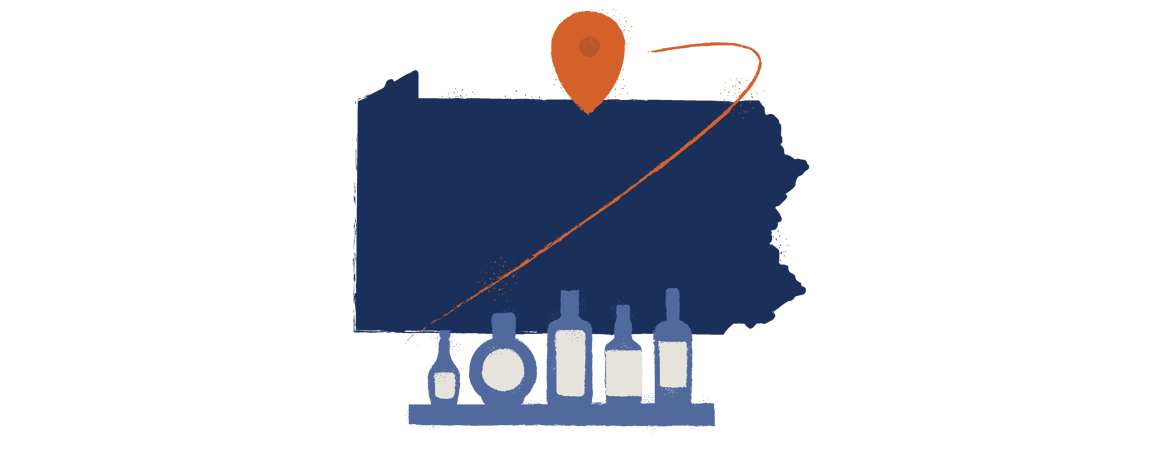
Address: 406 Northwest Office Building Harrisburg, PA 17124-0001
Phone: 1-800-332-7522
Website: https://www.lcb.pa.gov
The Pennsylvania Liquor Control Board (PLCB) consists of a three-member board who are all appointed by the Governor and confirmed by the state Senate. As a state that excises control over retail sales, there are a variety of responsibilities assigned to the board. These responsibilities include regulating the state's beverage alcohol industry, promoting social responsibility, alcohol education, selling wines and spirits, and maximizing financial returns for the benefit of the state.
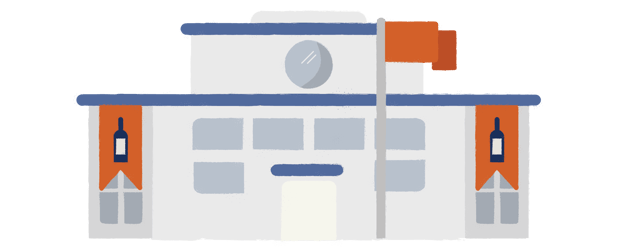
Controlled Alcohol: Wine, Beer, and Spirits
The state of Pennsylvania tightly regulates the selling and purchasing of wines and spirits. The agency controls the manufacturing, importation, sale, distribution, and disposition of liquor, alcohol, and malt of brewed beverages in the state. As a result, wholesale operations of wine and spirits are controlled by the state, and licensees are allowed to purchase their orders from the state-operated Fine Wine and Good Spirits stores, have their orders delivered from the PLCB distribution centers for high-volume licensees or pickup from one of 12 service centers available for licensees.
State law includes a local option for municipalities, but not counties. As of August 2018, 685 Pennsylvania municipalities are at least partially dry according to the National Alcohol Beverage Control Association.
The state-operated stores maintain an extensive inventory of over 94,000 various wines and spirits. Orders can be placed through Licensee Online Order Portal (LOOP). LOOP provides some interesting features, such as providing price-per-ounce information so that licensees can compare products, and the system instantly shows licensees how much is saved on an order.
If orders are delivered, payment can be made online. However, payment for all pickup orders must be made in person during pickup. Licensees receive a 10% discount on the purchase price for orders placed through LOOP.
Pennsylvania liquor pricing is controlled by state law. There are no additional discounts available beyond the 10% for orders through a loop and state law does not allow any promotions.
Licensees can place special orders for products if they aren't available in a local store. Through Special Order, there are thousands of products suppliers have opted to make available and many suppliers make certain wines and spirits available only through Special Order.
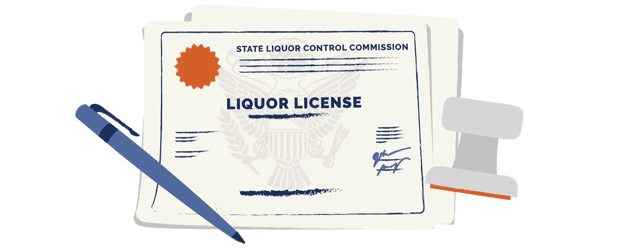
Obtaining a liquor license in the state of Pennsylvania can be difficult for several reasons. Liquor licenses in this state are based on a statutory quota. This means that the number of licenses permitted is restricted by the number of residents in that area. For a change in the number of licenses permitted to occur, there would have to be a change in the population in the area you are seeking a license. As a result, it is common for those seeking a new license to gain one through the state's Restaurant License Auction.
For information on how to obtain a liquor license, you must email the Pennsylvania Liquor Control Board.
The Restaurant License Auction allows the PLCB to auction off expired licenses to the highest bidder. The number of licenses available for auction varies, along with the average winning bid. For instance, an auction held in March of 2019 had 8 licenses up for auction and the average winning bid was $95,525. On the other hand in August of 2018, there were 25 licenses up for auction and the average winning bid was $73,915.
For information regarding future auctions and the results of previous auctions, click here. Future auctions typically have a deadline set on when bids must be submitted before the auction date.
How to Participate in An Auction
To bid on a license up for auction a bidder must submit a completed bid package. This includes a PLCB Bid Sheet for the particular license, signed and sealed, along with a bid guarantee in the amount of $5,000 (a certified check, cashier's check, or bid bond). The package must then be submitted in a sealed envelope, with your IFB number labeled on the outside, the auction number of the license, and the name of the person or entity bidding. The package must be mailed or hand carried to the below address:
PLCB Purchasing & Contract Administration Division
Invitation for Bid #XXXXXX
Northwest Office Building, Room 316
Harrisburg, PA 17124-0001
In order to participate in an auction there is a minimum bid of $25,000 for a license. Bid amounts must be in whole dollars and the highest bidder has the right to apply for a transfer of the auctioned license.
Also, you are allowed to bid on more than one license and a separate bid package must be submitted for every license you wish to bid on.
Once all bids are placed, shortly thereafter the bid opening will take place. It is asked that bidders limit attendance to two persons per bidding party and attendance is optional. No awards will be made at the opening but instead through a formal Notice of Selection.
Next Steps for those that won a bid for a license:
Below we have listed other methods to obtain an alcoholic beverage license:
Minimum Size of Licensed Premise: 400 sq. ft
Food & Seating Requirements:
Health License Requirements: Must have a current and valid health license issued by your governing municipal authority.
Minimum Size of Licensed Premise: 300 sq. ft
Food & Seating Requirements:
Health License Requirements: Must have a current and valid health license issued by your governing municipal authority.
Room Requirements: A functioning kitchen or food preparation area must be on site
Minimum Size of Licensed Premise: 400 sq. ft
Food & Seating Requirements:
Health License Requirements: Must have a current and valid health license issued by your governing municipal authority.
Room Requirements:
For more information regarding the food regulations, click here.
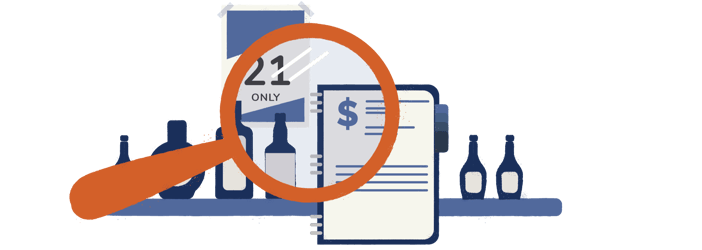
Inspections of Licensed Premises are handled by the PLCB's Licensee Compliance Program. Whenever there is a complaint filed against the licensee, a licensing analyst, law enforcement, and or municipal officials will conduct an unannounced on-site visit. Complaints include but are not limited to seating, food, square footage, health license, and violations of other licensee requirements. If there are no violations evident during the inspection an internal report will be completed and will remain in the licensee's official file with the PLCB Bureau of Licensing.
If there are deficiencies found during your visit they will be documented and addressed in the following manner:
Repeat Offenders: Licensed premises that have repeated violations of the license requirements will result in the following actions:

There are a variety of different training programs offered by the PCLB. One of their responsibilities includes the prevention of underage and dangerous drinking. As a way to encourage licensees to participate in the efforts of the PCLB local partners are rewarded Alcohol Education grants for their deterrence efforts. Below we have listed and provided information regarding the various alcohol training programs.
Employee training is required in the state of Pennsylvania. For employees of licensed locations, anyone who serves or sells alcoholic beverages and/or checks IDs- including bartenders, waiters, bouncers, doorpersons, etc.- must complete the RAMP server/seller training within the first 6 months of their hiring. The only exception is if the employee has successfully completed RAMP server/seller training prior to being hired.
This program created by the PLCB assists licensees in identifying fake identification cards, tips to prevent the sale of alcohol to minors, and ways to recognize and handle visibly intoxicated patrons, along with understanding the liability these issues present to their business.
RAMP certification can also be required beyond initial hiring and for the following reasons:
There are a variety of different certificates one can earn after completing the RAMP training and they include
Simply completing the owner/manager training or the server/seller training does not grant certification to the establishment of the person completing the training. In order for a licensed premise to receive its RAMP certification, the following steps must be completed.
Owner/Manager Training
For assistance regarding your RAMP Certification, you can contact your regional office.
Central Region, 717.558.2160
Eastern Region, 610.940.1217
Western Region, 412.723.0109
Every year the PLCB host a free conference where experts in alcohol education share their experiences and knowledge with members of the industry who are interested in reducing underage drinking and promoting responsible drinking among those of age.
The theme of the conference changes each year, so the workshops and presentations are always based on the latest information, trends, and methods. More information for this year's Pennsylvania Annual Alcohol Education Conference.
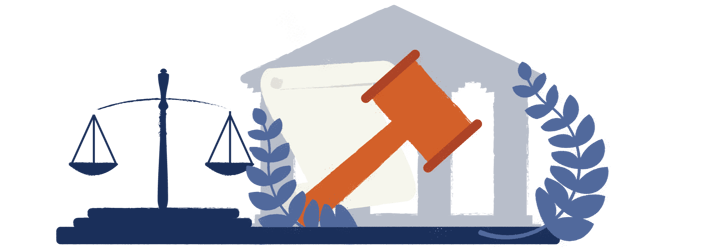
Pennsylvania laws regarding the purchasing, serving, and selling of alcoholic beverages can be complex. Here we have listed and explained some of the laws of the state. Please note this is not legal advice or inclusive of all Pennsylvania Liquor Laws.
Mon-Fri: 7 AM til 2AM*
*Club Licenses are permitted to sell alcoholic beverages until 3 AM and patrons must vacate by 3:30 AM

Throughout the year the PLCB host several different public meetings. A list of future meetings and minutes from previous meetings can be found here. All meetings begin at 11 AM in Room 117 of the PLCB Headquarters.
406 Northwest Office Building
Harrisburg, PA 17124-0001
The Pennsylvania Restaurant & Lodging Association's goal is to promote, protect, and improve the hospitality and tourism industries within the state. They are a great resource for Restaurants and Hotels when handling staffing, training, and discounts on necessities. Their website can be accessed here.
The Alliance consists of licensed beer wholesalers that are licensed to purchase or sell malt or brewed beverages as importing distributors. Their website can be accessed here.
Fill out the form on the right and we'll email you a PDF version to download and print as a quick reference sheet.